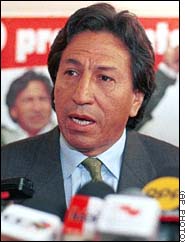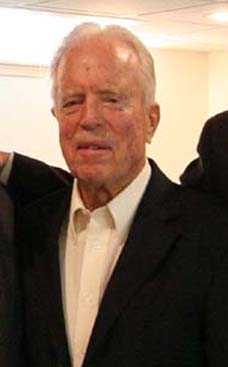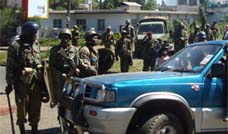
The “conventional wisdom,” Toledo said, is that economic growth will lead to poverty and inequality reduction. But without trickle-down effects, this sometimes isn’t the case and can lead to higher levels of inequality. According to him, this inequality leads to corruption, and disillusionment with the democratic institutions. Instead, he suggested, leaders must enact micro-reforms to target specific problems such as education, health care, and nutrition as part of a “concrete social agenda of democracy in Latin America over the next 20 years.” Alejandro Toledo grew up in Chimbote and was befriended by Peace Corps Volunteers who helped him study in the United States. Later he was a language instructor in Brockport's Peace Corps/College Degree Program. Elected President of Peru in 2000, Toledo invited the Peace Corps to return to Peru after a 27 year absence. He is presently a visiting Fellow at Stanford University.
Toledo Speaks on Latin American Democracy
Toledo Visits Campus, Speaks on Latin American Democracy
by Irina Oberman
Staff Writer
“Alejandro Toledo does not fit the image of a Latin American president. His skin is too dark, his nose is too prominent; his hair is too long.” This is a description of the former President of Peru, Alejandro Toledo, as described by Stanford professor Larry Diamond in his book, The Spirit of Democracy.
On January 24, Toledo, the Freeman Spogli Institute for International Studies’ Payne Distinguished Scholar, delivered a moving, personally based speech about his belief that democracy is imperative in alleviating poverty and suffering in developing Latin American countries, drawing on his experiences as President of Peru from 2001 to 2006. A child from an extremely poor Peruvian village, Toledo was given the opportunity to study in America first at the University of San Francisco and then at Stanford University. These experiences, he said, inspired him to dedicate the rest of his life to bringing similar opportunities of education and more to the poor of Latin America.
Most people today, Toledo argued, are talking about the growth of countries like China, India, Russia, or Brazil – they fail to see recent, monumental developments in Latin America. He began by explaining his “cautious optimism” about the potential for economic growth in Latin America, citing figures such as the region’s overall 6% growth and its new markets for agricultural products in China and Europe. However, he emphasized, it is democratic institutions that are the greatest factor in increasing this economic growth. Without a strong, neutral judiciary system, freedom of the press, human rights, and accountability, such an amazing comeback would not have been possible.
Nevertheless, this boom comes with a price. Showing graphs of income distribution in the region, Toledo pointed out the fact that in the last six years, inequality has drastically increased. Presenting pictures of pot-bellied dirty children and villagers, he said that income “doesn’t capture the drama of poverty,” or the associated the infant mortality, malnutrition, the lack of access of education.
The “conventional wisdom,” Toledo said, is that economic growth will lead to poverty and inequality reduction. But without trickle-down effects, this sometimes isn’t the case and can lead to higher levels of inequality. According to him, this inequality leads to corruption, and disillusionment with the democratic institutions. Instead, he suggested, leaders must enact micro-reforms to target specific problems such as education, health care, and nutrition as part of a “concrete social agenda of democracy in Latin America over the next 20 years.”
Despite the gains under his leadership in real GDP, foreign direct investment, exports, and a reduction in fiscal deficits, Toledo is unsatisfied with what he has done in the social sector. If Latin America does not capitalize on the increase of prices in the world market currently, poverty will begin to increase when prices fall. Leaders, he said, must have courage to invest in “short-term” reforms, even knowing that the effects of such reforms are not immediately visible, making them less politically profitable. “We need to break away from the dictatorship of oil,” he emphasized, and, “invest heavily in nutrition, health, and education,” that is, in micro projects target to the poor, especially women. When questioned later about these projects, he cited one of his reforms that gave $30 to each woman in an extremely poor village with requirements of two pre-natal and post-natal exams, and vaccination and education of their children. “I don’t know how effective these programs are,” he said, because of their long-term nature; however he maintained that he had strong confidence in these reforms, and in their potential for efficacy.
When asked by Professor Michael McFaul about how he dealt with the opinions that one hears from other countries, particularly the former Soviet Union, about the virtual impossibility of enacting economic reform, Toledo cited his naiveté and inexperience, but firm belief in democracy as his guiding principle. “Thank God I didn’t have experience!” he said, “I didn’t know how many crocodiles were in the swimming pool.” All he knows, he said, is that poverty can only be reduced within democracy. Breaking the vicious cycle of poverty causing inequality, and thus corruption, can only be done in a democracy that lets people demand accountability from its leaders; otherwise, corruption will continue running rampant.
Elevating a country of low GDP, a corrupt judiciary system, and little faith in democratic institutions has been no simple task. Toledo pointed out his popularity level of 8% at one time during his career. His term ended, however with a 65% approval rating. “Whatever I have done,” he said, “history and the government will judge, but I did it within a framework of absolute respect to democratic institutions.” This courage and whole-hearted dedication to the principles of democracy are the marking characteristics of Toledo and his message, and ones that the world could well afford to emulate.










